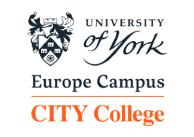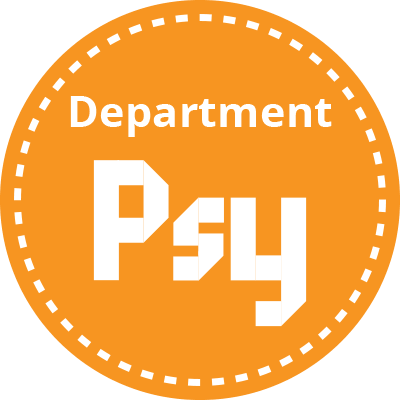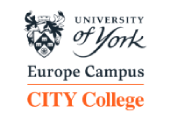Clinical Psychology - MSc


Degree title: The title of Master of Science in Clinical Psychology is awarded directly from the University of York
Duration:
Full Time
1 year with a dissertation
1.5 years with a practical internship
Part Time
2 years with a dissertation
2.5 years with a practical internship
Mode of delivery: Classes take place on weekday evenings
Language of instruction: English
Fees (Early Bird Scholarships)
We encourage you to take advantage of our Early Bird Scholarships scheme to save on tuition fees and secure your spot.
For more information, please fill in the form above or call us at (+30) 2310-224026.
The programme
This curriculum of this programme is informed by the criteria and standards of relevant professional councils to ensure that by the end of training students will have developed the basic competencies a clinical psychologist should possess:
- knowledge and skills of clinical psychology applicable in various settings and situations, both ethically and legally
- Understanding of how different approaches can be used and synthesized to treat mental health behaviors
- Appreciation of the importance of factors that determine well being
- A good level of self-awareness, which sets the limits of their practice
- Ability to evaluate (and use where appropriate) research related methods suitable for particular themes and research questions
- Ability to communicate r knowledge and understanding clearly, both orally and in writing
- Ability to deal with problems systematically and scientifically
- Ability to apply the reflective practitioner approach
Delivery format
A variety of teaching methods such as role plays, experiential exercises, interactive lectures, case studies, videos, workshops and group work, will be used in this programme for promoting understanding of the relevant clinical issues, and development as well as practice of the relevant skills.
Practicum
An opportunity for students to choose a clinical placement and get real-life experience
Internship opportunities at the "G. Papanikolaou" General Hospital of Thessaloniki
This programme will equip students with critical understanding, knowledge and skills in the field of clinical psychology and will prepare them for a career in the clinical sector. The strong experiential component of the course combined with the reflective practitioner approach, provides an opportunity to exercise clinical skills within the practical internship context, including an evidence-based approach and clinically oriented research. This will significantly enhance the employability of trainees. Trainees will also be offered the opportunity to choose an extended and supervised clinical placement beyond the taught part of clinical skills, with one of our clinical partners (e.g. local hospitals/clinics) - including internship opportunities at the "G. Papanikolaou" General Hospital of Thessaloniki - or find a placement of their own choice, subject to approval by the Department Fitness to Practice Committee. Fluency in Greek is a prerequisite to practice in a local clinical sector. During the practicum they can practically apply their academic knowledge while simultaneously getting the invaluable experience of working with patients in a real-world healthcare setting.
Why choose this course?
-
Degree from one of the world’s top universities, the University of York.
-
A pathway to a successful career in Europe and abroad.
-
The programme will provide you with a deep understanding of the treatment and assessment of mental health problems and with the practical skills you need to follow a clinically or research oriented career in the mental health sector.
-
With an evidence-based approach and a combination of different teaching methods you will acquire subject specific and transferable skills for either expanding your studies into a PhD or your future career as a clinical psychologist.
-
The course has a strong experiential component with in-class demonstrations and practical applications of clinical psychology, emphasizing the reflective practitioner approach which facilitates efficient practice.
Strong aspects of the programme
This programme contains a strong experiential component and trainees should be willing to engage in interactive activities. Trainees are required also to complete at least 25 sessions of personal counselling, as part of their programme, offered for free by the Department. Entry to the practical internship is not possible if the above conditions are not met. Graduates of this programme will have developed a complete professional identity characterized by:- Utilising the professional standards that are essential in the workplace of the health care fields, Psychology, as well as an array of analytical, methodological, and statistical research skills.
- Reflecting upon strengths and weaknesses and taking the responsibility for their own personal and professional development.
- Working ethically and professionally within a wide range of applications.
- Being able to maintain fitness to practice.
More reasons why:
-
Supportive learning environment with a wide range of support services available to students.
-
Free participation in sports and clubs activities.
-
Events with well-recognised psychologists. Students attend events, seminars and workshops by psychologists who share their expertise.
- Our state of the art library, the Information and Learning Commons (ILC) fully supports our students’ study experience.
Watch Online - Webinar on Clinical Psychology by our Psychology Department
- Current Paradigms in Counselling & Psychotherapy
- Fundamentals of Neuropsychology
- Introduction to Research
- Psychopathology
Semester 2
- Core Skills in Clinical Practice
- Clinical Interviewing & Assessment
- Severe Mental Health Issues
- Interventions for Anxiety and Depression
Semester 3
- Dissertation or
- Practical Internship
*Note: The programme is tentative and might be subject to changes
Current Paradigms in Counselling & Psychotherapy
This module familiarizes students with the major theories and perspectives of counselling and psychotherapy and it strongly emphasizes the application of these theories to real-world practice. It also explores empirical evidence for the efficacy of the various theoretical approaches, ethical considerations, and current paradigms in professional counselling and practice. Some examples of the therapeutic approaches that will be addressed are Psychoanalytic, Adlerian, Existential, Person-centred, Gestalt, reality, Cognitive-behaviour, and postmodern approaches) as they are used in practice. ![]()
Fundamentals of Neuropsychology
This module covers the main areas and methods used in investigating brain structure and function. The module will provide knowledge in brain structure and function both at the macro and micro level (cellular, molecular); and the relationship between brain structure and function and mental processes. The module will also introduce basic principles and mechanisms of brain recovery after head traumatic injury and stroke. Finally this module will also introduce methods in neuroscience, in particular imaging methods (EEG, fMRI etc), cases studies, and applied clinical neuroscience (e.g., neurofeedback, TMS, tDCS etc.). ![]()
Introduction to Research
This module covers the practice of research methods in clinical neuropsychology, with particular attention to the opportunities and challenges that neuropsychologists face in applying the methods of science to the study of human behaviour. A great emphasis will also be given to the ethical issues in research methods. The first half of the course will provide an introduction to research methods, and more specifically the research process. The second half of course will be comprised of workshops where students can explore practical problems/issues in relation to research. This module is designed to cover both quantitative and qualitative methodologies equally. Students will be exposed to the issues and decision-making processes that a researcher must respond to effectively address research questions or ideas. ![]()
Psychopathology
This unit provides a fresh perspective on the clinical applicability and recent developments of the DSM-V. The course bridges theory and practice to advance skills and knowledge in a broad spectrum of psychopathological conditions and on designing a roadmap to clinical diagnosis. This will cover step by step the diagnostic principles in order to be able to identify signs and syndromes, construct differential diagnosis, work on decision tree to select most likely provisional diagnosis and recognize comorbidity (simultaneous presentation of two or more disorders). ![]()
Core Skills in Clinical Practice
This module is an issue-based learning unit which will underline the core skills that a clinical psychologist needs to develop in order to practice within a wide range of applications. It will emphasize the interrelationship between communication skills, reflective skills, subject specific knowledge and a prejudice-free attitude to deal with various cases in an equal manner. It will also promote the importance of continuous learning for creating and maintaining relationships with service users and colleagues. The module will incorporate experiential learning to facilitate learning in an evidence based context. ![]()
Clinical Interviewing & Assessment
This module will provide an in-depth elaboration on interviewing and diagnostic skills, using semi-structured interviews, mental status examination and standardized interviews. It will demonstrate real practice or simulated cases of psychopathology. It will also facilitate an understanding of theoretical and practical issues in assessment, as well as the importance of accurately communicating/reporting them. Good communication skills and reflective techniques constitute an essential part of the module. ![]()
Severe Mental Health Issues
This module fosters the recovery perspective that relies on the integration process and utilises theories and approaches that have significant usefulness within social contexts. It will be based on real cases material brought by those involved in teaching, to use as a basis in order to discuss and apply the relevant issues addressed by the theories taught. The course will also promote the foundation for understanding the role of family relationships and the supportive networks in recovery and/or inclusion. ![]()
Interventions for Anxiety and Depression
Anxiety and depression are two of the most frequently encountered conditions in clinical psychology and this module will be based on real cases scenarios which will demonstrate techniques and interventions for treating them. Theory and practice will be combined to facilitate understanding of the techniques used and students will be asked to practice the techniques in a real or simulated context with appropriate guidance from the relevant specialists who will be involved in teaching the module. ![]()
Entry requirements
View the application and admission requirements of the programme.
How to apply
If you wish to apply for this programme you may view details of the application process.
Any questions?
If you'd like to know more about this programme, contact our Admissions Team at
admissions
The Psychology Department of CITY College, University of York Europe Campus has excellent reputation due to the high quality of teaching and research. Our academic staff is strongly committed to excellence in research and in teaching at both undergraduate and postgraduate level. Teaching is informed by the latest scientific research and cultivates development of critical thinking, self-development, and academic and professional ethos. Most of the academic staff hold a PhD degree, have intensive research activity and significant professional experience.
More about the Psychology Department
Research at the Psychology Department
Recognition and Careers
Accreditation and Recognition
CITY College is strongly committed to quality education and academic excellence. It is officially accredited and recognised by top international accreditation bodies. Read more
Degree and formal qualifications
The degree and formal qualifications our graduates receive.
For Greek graduates only: Recognition of degrees
Career opportunities
A graduate of a clinical psychology master can work as a:
- Mental Health Counsellor,
- Consultant,
- Policy Maker,
- Clinical Practitioner,
- Trainer or
- Practitioner Psychologist*
in settings where clinical psychology is exercised such as psychiatric hospitals and clinics, community centers, mental health centers, schools and private practices.
*Subject to graduate basis; i.e. undergraduate studies in psychology.
Career, Employability and Enterprise Centre
The Career, Employability and Enterprise Centre, focuses on helping students to set attainable career goals. It offers advice on CVs and cover letters, and on how to effectively handle job interviews. Through career fairs, and different internship programmes, the department aims at constantly bringing students in contact with prospective employers.
Every spring we organize the Annual Career Fair presenting with an opportunity to get a first feel of job seeking. During the event students and alumni have interview opportunities with corporate recruiters and present their skills and abilities to potential employers. Large companies, organisations and multinationals from different industries across S.E. Europe participate every year in our Career Fair and offer employment and internship opportunities to our students and graduates.
More about our Career Services.
Contact the Career, Employability and Enterprise Centre at careers@york.citycollege.eu
Extensively experienced and highly qualified, all staff members are committed to delivering our programmes in line with the UK standards of quality and at the same time they facilitate and sustain a critical engagement, with an insight and a broader perspective incorporated in all learning, teaching and assessment methods.

“I am really proud to be part of the particular team of people. Highly skilled and with diverse specialties they are primarily focused on our students and their development. With an authentic interest in people and an inclusive attitude, we can make all of our students succeed and thrive in any highly demanding environment.”
Dr. Suzie Savvidou
Head of the Psychology Department
The academic staff & administration staff of the Psychology Department











